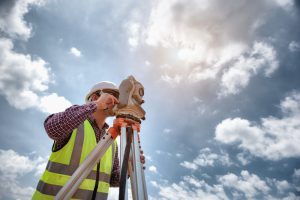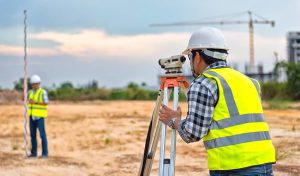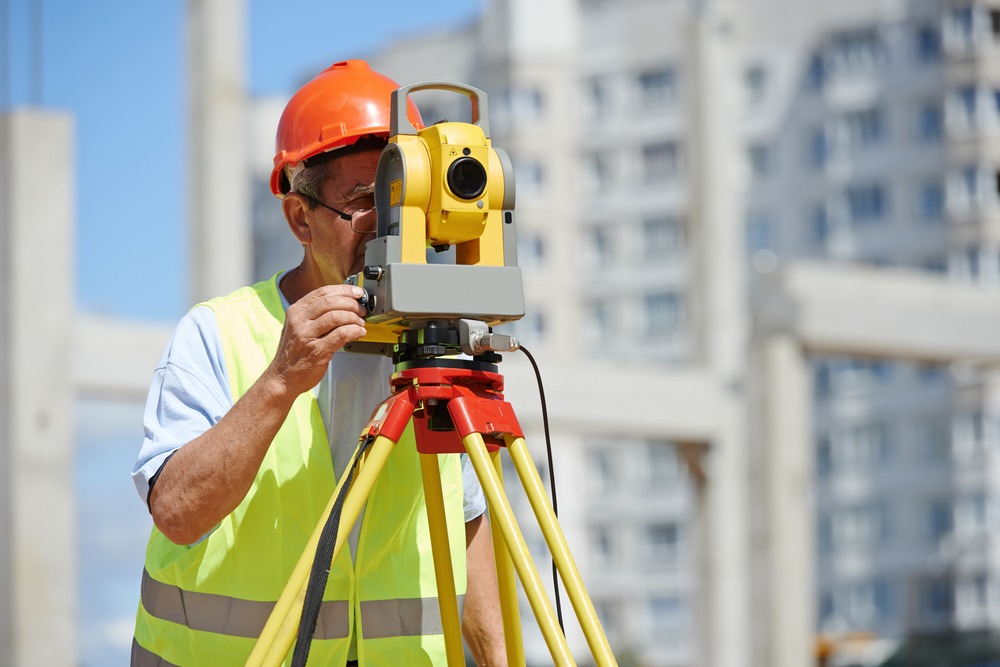To understand how to become a surveyor, earn a bachelor’s degree in surveying or a related field, gain practical experience through internships, and learn to use essential tools like GPS and GIS software. Pursuing chartered status with RICS can enhance career opportunities. This guide will show you how to become a surveyor, the qualifications needed, and the essential skills for success.
What Are the Main Types of Surveyors?
Surveyors are specialists in land, property, construction, and environmental assessment. There are several types of surveyors, each with specific roles and responsibilities. Below are the most common types:
- Land Surveyor: Maps and measures boundaries of land, working with property lines and legal jurisdictions. They use GPS, laser, and mapping technology to create surveys.
- Building Surveyor: Assesses the condition of buildings and other physical structures. Building surveyors inspect properties, advise on repairs and maintenance, and ensure compliance with regulations, including safety matters.
- Quantity Surveyor: Deals with costs and budgeting on building sites. Quantity surveyors estimate costs, control expenditures, and keep projects within budget while ensuring quality.
- Environmental Surveyor: Surveys land for environmental impacts, such as contamination, soil erosion, and water quality. They often work with developers and governments to ensure projects are environmentally safe.
- Valuation Surveyor: Assesses the value of land, buildings, and property for sale, purchase, or insurance. Valuation surveyors provide accurate assessments regarding size, market value, and condition.
- Hydrographic Surveyor: Maps underwater landscapes, including seabeds and rivers, aiding navigation, construction, and environmental protection.
- Geodetic Surveyor: Uses global positioning systems (GPS) and satellite data to measure large land areas, providing precise measurements for mapping, navigation, and scientific research.
- Alberta Land Surveyor: These surveyors are land specialists registered in the Province of Alberta. They also work in condominiums, which are large buildings divided into separate ownership units.
- Alberta Registered Professional Technologist (RPT) Land Surveyor: This type of land surveyor is in training and works under the supervision of a more experienced surveyor. Their work is overseen and approved by a registered professional engineer.
- BC Land Surveyor: These surveyors manage land that is registered in the Province of British Columbia and also deal with condominiums.
- Land Survey Assistant: These are non-registered technicians whose work is overseen by a more experienced surveyor.
It is important to understand the differences in knowledge and technical skills required for each type of surveying role to select a field that interests you and aligns with your career goals.
What Does a Surveyor Do?
Surveyors measure and record information about land, buildings, and the environment to provide data that supports property development, construction, and land management. They gather, analyse, and interpret this information, collaborating with other professionals in the process. Here is an overview of the responsibilities of a surveyor:

- Surveying Sites and Taking Measurements: Surveyors use specialised equipment to measure distances, angles, and elevations on land, in water, or at construction sites. They ensure the accuracy of their data collection by preparing precise maps, reports, and boundary details. This foundational work is critical for various surveying applications. Their measurements guide decisions in property development and construction.
- Preparing Maps and Reports: Site surveyors compile data to create detailed maps, charts, and reports that illustrate site characteristics. These documents highlight topography, building locations, and ownership status. They serve as essential tools for clients, developers, and government authorities. Accurate reporting is vital for informed decision-making regarding land use.
- Advising on Boundaries of Land and Property: Surveyors determine land and property boundaries, providing crucial information for resolving ownership disputes. Their findings are legally binding, and often referenced in legal contexts. They work closely with legal teams to clarify boundary issues. This role helps ensure compliance and reduce conflicts over land use.
- Cost Estimations and Budget Planning: Quantity surveyors are responsible for preparing cost estimates and establishing budgets for construction projects. They track expenditures to ensure projects remain within financial limits. Their expertise prevents cost overruns, promoting efficient project management. Accurate budgeting is essential for successful project delivery.
- Surveying Building Condition and Safety: Building surveyors perform comprehensive evaluations of a property’s structural integrity and safety compliance. They assess necessary repairs and provide recommendations for improvements. Their work ensures that buildings meet safety standards and function effectively. This role is crucial for maintaining safe living and working environments.
- Environmental Surveyor: Environmental surveyors assess the impact of development projects by inspecting contamination levels, water quality, and land erosion. They ensure that projects comply with environmental regulations and standards. Their work supports sustainable development practices. This role is vital for protecting ecosystems and public health.
- Advanced Surveying Technology: Surveyors leverage cutting-edge technology, including GPS, laser scanners, and drones, to gather and analyse data. This technology enhances the precision of their measurements, maps, and 3D models. Advanced tools improve the accuracy and efficiency of surveying tasks. Innovation in surveying technology is crucial for modern practices.
The work of a surveyor is essential for providing reliable data that ensures property development and land management are conducted safely, sustainably, and in accordance with the law.
Average Surveyor Salary
The salaries for surveyors are not fixed; they depend on specialisation, experience, and location. Here is an overview of what surveyors typically earn in the UK:
- Entry-Level Surveyors: Most often freshly qualified, these surveyors earn between £20,000 and £30,000 per year. These entry-level roles provide hands-on experience in data collection, mapping, and site analysis.
- Mid-Level Surveyors: After several years of experience, a surveyor can earn between £30,000 and £45,000. Mid-level surveyors take on more responsibilities, managing projects and collaborating with clients and contractors.
- Senior Surveyors: Senior surveyors, particularly in specialised areas such as quantity or geodetic surveying, earn between £45,000 and £70,000 or more. Senior positions usually involve supervising large-scale projects or teams.
- Chartered Surveyors: Surveyors who qualify as members (MRICS) of the Royal Institution of Chartered Surveyors (RICS) can earn between £50,000 and £90,000 or more per annum, depending on their specialisation and experience.
- Consulting and Freelance Surveyors: Freelance or consulting surveyors set their rates based on their expertise and available work. The most experienced consultants can command high fees for the most complex projects.
Essential Skills of a Surveyor
Surveyors require a combination of technical, analytical, and interpersonal skills. Key skills required for a surveyor include:

- Technical Competence: Surveyors must be proficient with various survey equipment, including GPS, laser scanners, and drones. Mastery of these tools is essential for collecting accurate data. This technical skill ensures reliable measurements that underpin their findings. Being adept with technology enhances overall surveying efficiency.
- Analysis and Attention to Detail: The surveying process requires precise measurements and calculations. Strong analytical skills are vital for interpreting data accurately. Attention to detail helps prevent costly errors in reports and plans. Surveyors must meticulously check their work to maintain quality and accuracy.
- Knowledge of Building Codes and Regulations: Familiarity with local and national building codes is essential for surveyors. They must understand environmental regulations and land-use laws before beginning projects. This knowledge ensures that their work complies with legal standards. It helps prevent potential legal issues during development.
- Problem-Solving and Decision-Making Skills: Surveyors frequently face on-site challenges that require quick resolution. They must assess technical problems and disputes over property boundaries effectively. Good problem-solving skills enable them to find practical solutions. Sound decision-making is crucial for successful project outcomes.
- Communication and Interpersonal Skills: Effective communication is vital for surveyors when interacting with clients and contractors. They need to explain complex technical information clearly and understandably. Building strong professional relationships is essential for successful collaboration. Good interpersonal skills enhance teamwork and project efficiency.
- Mathematics and Spatial Awareness: Strong mathematical skills are fundamental for surveyors, including measurements and data analysis. They must be adept at geometry and trigonometry to perform calculations accurately. Spatial awareness allows them to visualise land features and project impacts. This understanding aids in effective planning and design.
- Project Management Skills: Surveyors often take on project management responsibilities, ensuring tasks stay on schedule. They must coordinate with various stakeholders to keep projects on budget. Strong organisational skills help manage resources and timelines effectively. These skills are vital for the successful completion of surveying projects.
Surveyor Tips
Here are some essential tips for becoming a successful surveyor:
- Develop Maths and Science Skills: Maths is the foundation of surveying, so focus on enhancing your skills, particularly in geometry and trigonometry. Science courses, especially geography, are also beneficial for building a strong background.
- Internship or Apprenticeship: Many surveying firms offer internships or apprenticeships that provide practical experience working alongside experienced surveyors. These opportunities can significantly enhance your understanding of the field.
- Learn How to Use Surveying Technology: Familiarise yourself with essential tools such as GPS, drones, and software like AutoCAD and GIS. Gaining experience with these technologies during training or internships will give you an advantage over other entry-level applicants.
- Specialisation: While it’s possible, to begin with general qualifications, pursuing degree courses in surveying, geography, or engineering can provide in-depth knowledge and enhance your employment prospects.
- Study for RICS Accreditation: Secure your career success by obtaining accreditation from the Royal Institution of Chartered Surveyors (RICS). Achieving chartered status boosts your employment opportunities, credibility, and potential earnings.
- Learn to Communicate Well: Effective communication with clients and stakeholders is essential for conveying technical findings. Develop your communication skills to ensure you can present your results clearly and seek feedback from non-technical audiences.
- Stay Informed About Industry Developments and Standards: The surveying industry evolves with new technologies and materials. Stay updated by taking classes, attending workshops, and keeping informed about current trends and standards.
Surveyor Requirements
Becoming a surveyor requires education, technical skills, and a licence or certification. Here’s what you need to start a career as a surveyor:

- Bachelor’s Degree in Surveying or a Related Field: Most surveyors hold a bachelor’s degree in surveying, geography, civil engineering, or a related field. These specialised degrees equip students with essential skills in measurement, data analysis, and land assessment. A strong academic foundation is crucial for a successful career. It prepares graduates for the technical demands of the profession.
- Hands-On Learning Through Work Placements: Internships or work placements provide invaluable hands-on experience with surveying instruments and fieldwork. These practical opportunities enhance data collection skills and overall competency. Many surveying programmes include placements to ensure graduates are job-ready. Such experiences help bridge the gap between theory and practice.
- RICS Chartered Status (Optional but Beneficial): Achieving chartered status through the Royal Institution of Chartered Surveyors (RICS) can enhance career prospects. This qualification demonstrates a high level of professional competence. To become a Chartered Surveyor, candidates must complete the RICS Assessment of Professional Competence (APC). This credential is highly regarded within the industry.
- Expertise with Surveying Software and Equipment: Surveyors must be proficient in using tools like GPS, AutoCAD, GIS, and Total Stations. Mastery of these technologies is essential for accurate data collection and mapping. Familiarity with modern surveying equipment enhances efficiency and precision. Staying updated with software advancements is key to maintaining competitiveness.
- Knowledge of Legal and Environmental Regulations: Surveyors need a solid understanding of laws related to property, land use, and environmental standards. Familiarity with legal regulations ensures compliance in all projects. This knowledge helps prevent legal disputes and promotes sustainable practices. Being informed about regulations is vital for a responsible surveying career.
How to Become a Surveyor
Here’s a step-by-step guide to becoming a surveyor:

- Get a Bachelor’s Degree in Surveying or a Related Field: Start with a degree in surveying, civil engineering, geography, or a related field. Focus on essential subjects like geometry, data analysis, and environmental science. This foundational education provides the necessary technical knowledge for your career. A strong academic background is crucial for future opportunities.
- Work Placements and Internships: Engage in work placements during your studies to gain practical experience. Internships with surveying firms allow you to apply theoretical knowledge in real-world settings. You’ll learn to use surveying equipment and understand the industry’s demands. These experiences enhance your skills and employability.
- Master’s Degree or Additional Training (Optional): Consider pursuing a master’s degree for specialisation in areas like hydrographic or environmental surveying. Additional certifications can provide niche expertise that sets you apart. Advanced training can deepen your knowledge and improve job prospects. Specialisation may open doors to more advanced roles.
- Get Acquainted with the Tools: Familiarise yourself with essential surveying tools, including GPS, drones, and GIS software. Proficiency with these technologies is vital for modern surveying practices. Understanding how to use these instruments effectively enhances your data collection skills. Being tech-savvy gives you a competitive edge in the field.
- APC for Chartered Status (Beneficial but Optional): After gaining relevant work experience, consider sitting for the Assessment of Professional Competence (APC). Achieving Chartered Surveyor status through RICS is a prestigious milestone in your career. This qualification can significantly enhance your employment prospects and credibility. Chartered status demonstrates a high level of professionalism.
- Apply for Surveyor Jobs: Once you have the education and experience, start applying for entry-level surveyor positions. Highlight your technical skills, experience with surveying tools, and knowledge of regulations in your applications. Tailor your CV and cover letter to showcase your qualifications. Be proactive in networking to uncover job opportunities.
- CPD: Engage in Continuing Professional Development to stay updated in the evolving surveying profession. Attend workshops, courses, and professional forums to enhance your skills. Keeping abreast of industry standards and technological advancements is crucial. CPD helps ensure your knowledge remains relevant throughout your career.
Get Qualified as a Surveyor
Building Surveying Certification, Land Surveying Online Course, Building Surveying Diploma, Quantity Surveying Comprehensive Course
Frequently Asked Questions
Why Should You Be a Surveyor?
A career as a surveyor offers numerous opportunities to work outdoors, tackle interesting problems, and contribute to property development and land management. Surveyors play a vital role in creating safe, sustainable environments. This profession is well-suited for those with a keen interest in property and land.
Is a Career as a Surveyor Right for You?
If you enjoy working with numbers and have strong mathematical skills, surveying could be an excellent fit. The role combines both fieldwork and office tasks, making it ideal for detail-oriented, technically inclined individuals who are interested in property and construction.
What are Typical Surveyor Salaries?
A trainee surveyor can expect to earn between £20,000 and £30,000, while a mid-level surveyor typically earns between £30,000 and £45,000. Senior surveyors and chartered surveyors can earn between £45,000 and £70,000. Consultants often earn more, depending on demand.
Which Qualifications Can Help with a Career as a Surveyor?
You will need a degree in surveying, geography, or engineering, and obtaining RICS (Royal Institution of Chartered Surveyors) status is highly valued. Employers also seek familiarity with surveying tools such as GPS and GIS software.
Do I Need to Be Experienced to Get Started?
Experience is crucial for surveyors. Internships, placements, or entry-level jobs provide hands-on skills and help build a professional network, preparing you for advancement into more senior roles.
What is the Career Outlook for Surveyors?
There will continue to be a strong demand for surveyors in construction, real estate, and environmental management. Experienced professionals can advance into senior roles, become chartered, or work as independent consultants in niche areas.
Surveyor Hierarchy and Progressing Within the Role
From entry-level positions, surveyors can progress to senior and chartered roles. With further experience, they may become project managers or directors responsible for large-scale projects and teams.
Surveyor Exit Options and Opportunities
Experienced surveyors may transition into project management, property development, or consultancy. Others might pursue careers in research or teaching, or work with government departments in policy and land-use planning.


